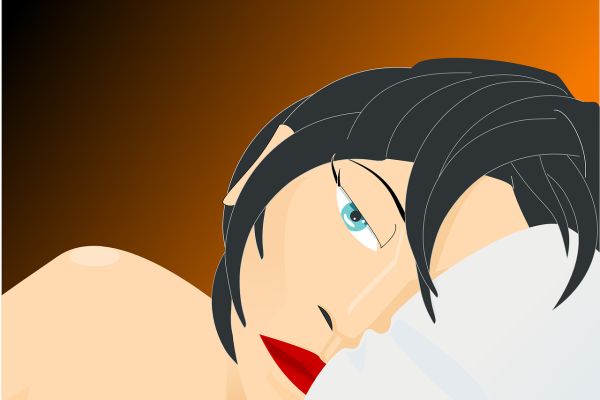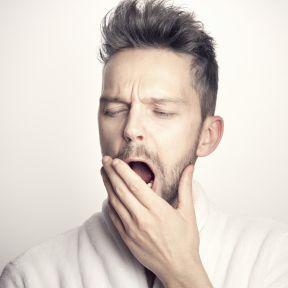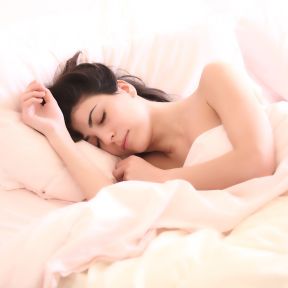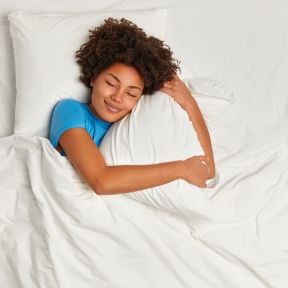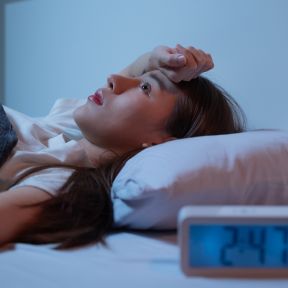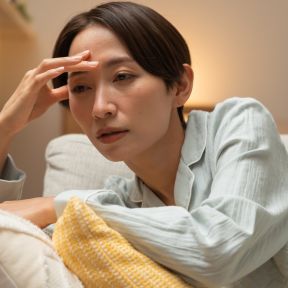
Insomnia
Insomnia is a sleep condition that involves difficulty falling asleep and staying asleep. Almost everyone goes through bouts of sleeplessness from time to time. But if someone struggles to fall asleep or wakes up at night or early in the morning and finds it difficult to fall back asleep, and this happens at least three times a week for a few months, that person is likely suffering from chronic insomnia.
Insomnia may cause daytime fatigue and reduced energy levels. People with insomnia may also experience weakened coping skills, difficulty paying attention and concentrating, memory problems, and trouble performing even routine tasks. But most of all, insomnia affects mood. The chronic sleep disruption of insomnia appears to be a major trigger for depression and irritability.
Short-acting sleeping pills may improve sleep and next-day alertness, but the best way to handle a bout of insomnia is to do nothing; the body's sleep mechanism tends to right itself if given the chance. The most effective treatments for chronic insomnia are behavioral techniques that eliminate sleep anxiety and allow the body's own sleep cycle to kick in.
For more information on symptoms, causes, and treatment see our Diagnosis Dictionary.
For more on getting better sleep, see the Sleep Center.
Contents
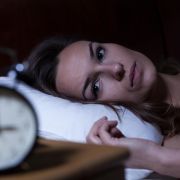
Stress is the primary cause of insomnia, but there are also physical conditions and other factors that can bring it on. A doctor should rule these out first. They include sleep apnea, overactive thyroid, certain medications, and gastrointestinal problems, such as gastroesophageal reflux. Lack of sufficient physical activity during the day can also interfere with the body's drive for sleep. Substance abuse can be a major sleep disruptor as well.
Insomnia is often related to how people handle a bad night or a few bad nights of sleep. One may try to compensate for a brief sleepless period by sleeping later, napping in the afternoon, having a few drinks before bed, or going to bed early. But those actions may only impair the body's natural sleep drive or cause more early wakefulness.
Some people are at risk of insomnia due to environmental factors such as shift work and jet lag. People who do not get enough exposure to sunlight during the day can also have trouble sleeping. And such factors as drinking too much caffeine or overheating a bedroom can also interfere with sleep.
Insomnia is often caused by stress. It can also be due to depression, chronic pain, substance use (including alcohol, prescription medications, or caffeine), or jet lag. Identifying the root cause of insomnia, if it’s not immediately obvious, can help an individual manage and treat it.
Yes. Using a smartphone (or another blue-light-emitting device) in bed can make sleep more difficult to come by, as can drinking caffeinated beverages or doing vigorous exercise too close to bedtime. Other, subtler behaviors—such as lying awake in bed for hours—can also worsen insomnia-related anxiety and train the brain to associate the bed with sleeplessness. Experts recommend getting up and doing a quiet activity rather than lying awake in bed.
Yes. Someone who is chronically sleep-deprived may adapt to feeling tired and may not realize the consequences of their insufficient sleep. Similarly, someone with a disorder like sleep apnea may feel as if they’re sleeping soundly—but in reality, the sleep they’re getting is unrestful and may cause daytime symptoms like fatigue, cognitive slowness, or irritability.
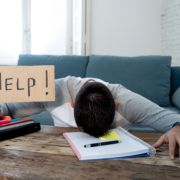
A short-term bout of insomnia is best handled by doing nothing. It's important not to compensate by staying in bed longer or napping during the day.
Chronic insomnia responds well to behavioral treatments aimed at eliminating anxiety and stopping the behaviors that wind up worsening and perpetuating the condition. Cognitive behavioral therapy targets the thoughts and actions that disrupt sleep. It may include relaxation training or establishing a sleep schedule that restricts the time one spends in bed awake.
Effective treatments for insomnia encourage good "sleep hygiene," which can involve going to sleep and waking at the same time every day, getting daily exercise, limiting caffeine consumption and restricting it to morning hours, limiting alcohol (a sleep disrupter), and keeping the bedroom dark and cool.
Chronic insomnia can last for years, especially if the individual does not seek help. With appropriate treatment, however, most cases of insomnia can be effectively managed and reach a point where bouts of short-term insomnia (which are normal for the majority of people) occur only rarely.
Someone who is unable to fall asleep should not stay in bed all night. Rather, they should get up and do a quiet activity (such as reading) until sleepiness sets in; at that point, they can return to bed to try again. The next day, they should maintain their normal schedule (rather than sleeping in or going to bed early). Using this approach, most cases of short-term insomnia resolve in 3 to 5 days.
The American Academy of Sleep Medicine recommends cognitive behavioral therapy for insomnia, or CBT-I, as the first-line treatment for chronic insomnia. Research has found that CBT-I has an efficacy rate as high as 80 percent and is more effective than medication.
Cognitive behavioral therapy for insomnia, or CBT-I, is a short-term form of therapy that aims to change counterproductive behaviors and unhelpful thought patterns that contribute to chronic insomnia. In addition to in-person or online sessions, CBT-I patients also typically keep a sleep diary, adjust sleep hygiene practices, and work to challenge negative thoughts about sleep.
Recent literature reviews have concluded that CBT-I that is delivered online is as effective as that delivered in-person. Due to a shortage of therapists trained in CBT-I, the approach is not widely utilized; online behavioral therapy programs could help make treatment more accessible to those with chronic insomnia.
Prescription sleeping pills or over-the-counter sleep aids can be helpful for treating short-term insomnia. However, long-term use can be habit-forming and the medications can come with unpleasant side effects. For chronic insomnia, CBT-I is the treatment of choice; medication is not recommended.
Exercising regularly, limiting caffeinated beverages, and working to reduce stress can all help someone manage insomnia. Melatonin supplements may also provide relief, though evidence of their long-term effectiveness is inconclusive. Some experts recommend only taking melatonin to correct a temporary disruption in the sleep-wake cycle, such as that caused by jet lag.
Going to bed and waking up at the same time each day, as well as practicing a relaxing pre-bedtime routine, can help someone recover from sleep disruptions and prime their mind and body for consistent sleep each night. Getting out of bed when unable to drift off—rather than lying there awake—can help break the mental association between one’s bed and wakefulness.

Young children need 10 to 11 hours of sleep, experts say, and teens need between 8 and 10 (adults, by contrast, need 7 to 8). Sleep difficulties in children often occur when consistent bedtimes are not strictly enforced. Comorbid mental health conditions like ADHD, depression, or anxiety can also contribute to childhood sleep problems.
Teenagers, in general, are a particularly sleep-deprived group: Experts estimate that only 15 percent of U.S. teenagers are getting the recommended amount of sleep. While teens are naturally inclined to stay up late and sleep in, academic demands and busy schedules can make late starts impossible; as a result, allowing teens to stay up too late can result in overtiredness and poorer functioning. Some evidence suggests that teens who stay up past midnight are more likely to develop depression than their early-to-bed counterparts. To counter this growing problem, some states, districts, and individual schools are shifting school start-times to later in the day so that teens can get more rest.
Insomnia tends to be rarer in children than in adults, and is more common in older children than younger children. Evidence suggests that as many as 10 percent of teenagers (ages 10-19) struggle with chronic insomnia. Children with ADHD display a higher prevalence of insomnia; as many as 75 percent are thought to have difficulties with sleep.
Parents can help by establishing—and enforcing—set times for going to sleep and waking up. Also essential is a consistent bedtime routine that helps the child wind down each evening; this can include a warm bath, reading together, or other soothing activities. Parents should also ensure children get enough exercise—a critical component of healthy sleep.
Because teens are biologically inclined to stay up later than adults, it can be difficult for parents to identify when insomnia has set in. There are, however, behavioral signs that parents can look out for, including mood swings, irritability, lethargy, and extreme difficulty waking. Parents who see these signs should ask their teen about their sleep habits and/or seek professional help.
Parents should continue encouraging bedtime routines and consistent sleep habits. They may also want to limit nighttime screen use, as smartphones and television can inhibit sleepiness. If a teen spends time in bed but is still unable to sleep, parents should allow them to get out of bed and engage in a quiet activity, such as reading, until fatigue sets in.

Women are especially sensitive to irregular sleeping habits because of the hormonal changes they experience during pregnancy and perimenopause. Studies indicate that about one in four women is currently experiencing insomnia symptoms.
Insomnia can cause women to have more accidents, with falls being especially common, especially for the elderly. Women with insomnia are at increased risk for certain health problems, including diabetes and high blood pressure. Women are also more likely to suffer from depression, which is linked to sleeplessness.
Insomnia is more common in women than it is in men. Higher rates of insomnia are due to hormonal changes that occur during pregnancy and menopause; women become increasingly more at risk of insomnia as age increases. However, other sleep disorders, such as sleep apnea, appear to be more common in men than in women.
It’s unclear if women, on average, need more sleep than men. However, some evidence suggests that women are more likely than men to be “early birds,” and may have shorter circadian rhythms than men. This may result in women feeling tired earlier in the evening and going to bed earlier than men.
Yes. Approximately a quarter of peri- or post-menopausal women report trouble falling asleep most nights, compared to 17 percent of premenopausal women. More than 30 percent of women undergoing menopause report trouble staying asleep, compared to 23 percent of premenopausal women.
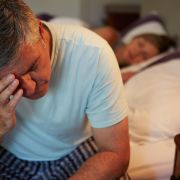
Mental health disorders like depression and anxiety are a major cause of insomnia; they can also be the result of insomnia, or be exacerbated by it. For some people, symptoms of depression or anxiety will appear before the onset of sleeping problems, while others will notice insomnia symptoms first and worsening mood later. Depression, in particular, often exists in a chicken-or-egg cycle with insomnia, in which they frequently appear side by side and it's unclear which appeared first—and due to the similarity of symptoms, insomnia can be misdiagnosed as depression, and vice versa.
The mood-sleep connection often plays out in a frustrating cycle for sufferers of either condition: Anxiety and rumination keep them up at night, and the lack of restorative sleep triggers a worse state of mind the next day. Treatment should target both mental health symptoms and insomnia in order to maximize results.
Depression and insomnia have an extremely high rate of co-occurrence, and some experts argue that sleep problems are a core symptom of depression. Research suggests that the two disorders are bi-conditional—meaning both that depression can give rise to insomnia and that insomnia can give rise to depression.
It can. Improved mood, increased energy, and decreased rumination—all effects of effective depression treatment—will also likely lead to better sleep. However, some medications used to treat depression can negatively impact sleep; it’s critical to discuss insomnia with a psychiatrist to ensure that antidepressant medication does not worsen it.
Though getting better sleep while depressed is often easier said than done, adequate amounts of good quality sleep can significantly improve mood. CBT-I—a form of therapy that aims to teach consistent sleep habits and encourage individuals to confront negative thoughts about sleep—has been shown to improve depressive symptoms in patients who reported both depression and insomnia.
Anxiety is a common driver of sleeplessness. Physical symptoms like restlessness and muscle tension, combined with cognitive symptoms of rumination or feeling mentally “on edge,” can all make sleep harder to come by or maintain.
It may be. Poor sleep has been linked to increased production of stress hormones and decreased activity in emotion-regulating areas of the brain; both effects can result in increased anxiety. Increased anxiety can then, in turn, worsen sleep, creating a never-ending cycle of anxiety and sleep deprivation. Conversely, treating anxiety, either with therapy or with lifestyle changes, often leads to more restful sleep.

